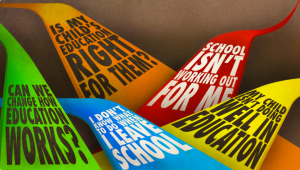 “Education is the biggest challenge facing human beings” in a race between “education and catastrophe”.
“Education is the biggest challenge facing human beings” in a race between “education and catastrophe”.
Inspired by the Youth, Skills and Work initiative I would like to think about what our youth needs to learn at school.
Our world is globalized, our schools are not. I mean, the people who frequent them certainly are but what happens inside those buildings is often the same that happend there 20 or 30 years ago. Like the people from the UK documentary We Are the People we’ve been Waiting For say: “the world is changing rapidly, but our education system is not keeping pace”. The documentary provides us also with the introductory quote which point out the importance of education. I agree, it is high time we had a closer look at the world we live in and then decide what we teach our children. That is the only way that they will be prepared for what awaits them in the future, a future which is likely to change even more radically.
The system we have is part of what has lead us to the point we stand now. Environmental distruction, global warming, a large-scale financial crisis we don’t get out of, tremendous state and private debt, growing numbers of unemployment and poverty and still there are people dying of hunger and of preventable diseases.
So what is the alternative? I believe what our schools need is a higher level of Global Education. This simply means bringing the world’s problems into the classroom, teaching those topics which are relevant to all people on the planet, such as social justice, environmental sustainability or intercultural and inter-religious learning. All of which mustn’t be turned into subjects. I rather think that these issues should be part of all of our traditional areas of teaching. This would mean for example to include teaching about social injustice in language teaching or in history and about the financial crisis in maths, ect. The goal of introducing Global Education to schools is to prepare our youth to become active members of the global community and – eventually – manage this planet in a better way than we do.
We are living in such an interconnected world, that thinking in subject barriers no longer works. The world doesn’t divide up between maths, language and history – and actually never has. Rather are those successful in today’s world which can adapt, change quickly to another environment. “Work is becoming increasingly flexible … companies are making greater use of short term contracts, temporary workers, and the self-employed.”, says the Horizon Scanning Report about the situation in the UK.
Generally, I think it is time we also think about school in a different manner. It is supposed to be the place where people learn how to learn so that they can later on teach themselves the skills they need when adapting to a new situation. This new perception means challenging the long-established idea of who is teaching and who is learning. The latter is easy, we are all learning. Today we need life-long learning.
On the other hand, who is teaching? Our teachers have over the years become overburdened with all the things they should and should not do. It mustn’t be that way. There are so many entities around us which know a lot about the topics mentioned above and are willing to join us in the classroom. I’m speaking of NGOs. Oxfam, WWF or Amnesty International to name a few are offering amazing teaching materials and support. Schools still have too weak and little links to these voluntary organizations.
Now, how does this relate to work and employability? “The vast majority of businesses think it is important for schools to be helping young people to think more globally and lead more sustainable lives, and four- fifths think schools should be doing more”. Hiss quote is taken from the Global Skills Gap report. The report was conducted by the British Development Education Association Think Global. From that report we also learn that “for job seekers, knowledge and awareness of the wider world is more important than degree classification or A-levels”.
I am aware that we live in a world in which some still struggle to simply learn how to read and write in school. Education is a challenge we have to face on so many levels. What do you think, is our educational system ready to go global? Maybe it is just like the documentary proposes, maybe we are the people we’ve been waiting for.
This has also been published on the website of the Youth, skills & work project.

We at Plan International USA agree with you–schools do need a higher level of global education. That’s why we created the Youth Engagement and Action (YEA) program, which offers excellent education materials, including curriculum on important global issues like Poverty and Climate Change, and even a School-2-School Linking program that connects classrooms around the world. Add us to your list of NGOs offering “amazing teaching materials and support”! Check out all our resources here: http://www.planusa.org/content2426138
Thanks for your reply, I’ll happily have a look at the material Plan is providing since I’m always on the lookout for good sources 🙂